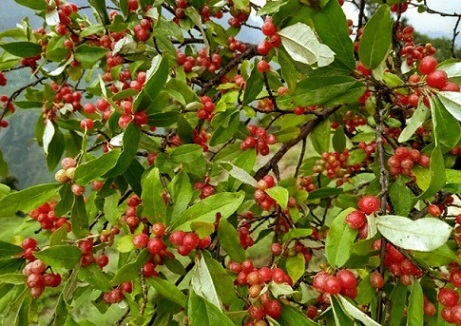Thailand medical researchers discover that Elaeagnus latifolia extracts can help tackle obesity and inflammation
Nikhil Prasad Fact checked by:Thailand Medical News Team Dec 08, 2024 1 year, 2 weeks, 1 day, 7 hours, 6 minutes ago
Thailand Medical: A fascinating new study by researchers from the University of Phayao, Thammasat University, Chulalongkorn University, and Mahidol University, all in Thailand, has revealed that Elaeagnus latifolia, a wild fruit native to Asia, holds promise for combating obesity and inflammation. This
Thailand Medical News report delves into the groundbreaking findings and their potential implications for health.
 Thailand medical researchers discover that Elaeagnus latifolia extracts can help tackle
Thailand medical researchers discover that Elaeagnus latifolia extracts can help tackle
obesity and inflammation
Elaeagnus latifolia, known for its rich nutrient profile, has long been used in traditional medicine. Scientists decided to investigate whether its extract could provide scientific evidence for its benefits, particularly in the areas of obesity and inflammation - two interconnected health challenges that continue to grow globally.
What the Study Explored
The researchers used both animal and cellular models to uncover the effects of Elaeagnus latifolia fruit extract. Laboratory mice on a high-fat diet were treated with the extract for 10 weeks, while in-vitro studies were conducted on macrophages - immune cells linked to inflammation.
The team sought to assess not only how the fruit extract impacted weight and fat accumulation but also its influence on molecular markers related to inflammation and oxidative stress.
Key Findings in the Fight Against Obesity
-Weight and Fat Reduction: Mice fed a high-fat diet and given the fruit extract showed significantly lower body weight and fat accumulation than their untreated counterparts. Adipose tissue, specifically in the abdominal region, was lighter and healthier in the treated group.
-Smaller Fat Cells: Histological analysis revealed that treated mice had smaller fat cells, a sign of healthier fat tissue. The extract seemed to enhance adipogenesis, the process of forming new fat cells that function better in storing fats.
-Cholesterol and Lipid Levels: The extract reduced harmful lipids, including cholesterol, triglycerides, and free fatty acids, in the abdominal fat tissues of the treated mice.
-Anti-Inflammatory Power of the Extract
Inflammation plays a significant role in obesity-related complications. The study demonstrated that Elaeagnus latifolia extract significantly decreased markers of inflammation in fat tissue and surrounding immune cells.
-Macrophage Modulation: The extract shifted macrophages from an inflammatory state (M1 type) to an anti-inflammatory state (M2 type), reducing inflammation.
-Reduction in Cytokines: Levels of pro-inflammatory molecules like TNF-α and IL-6 dropped significantly, while anti-inflammatory cytokines like IL-10 increased.
&n
bsp;
-Molecular Pathways: The extract inhibited key inflammatory pathways, such as the NF-κB pathway, which is often overactive in obesity-related inflammation.
Fighting Oxidative Stress
Obesity-related inflammation often correlates with oxidative stress. The study found that Elaeagnus latifolia extract reduced oxidative markers in treated mice and macrophages.
-Antioxidant Gene Activation: The extract boosted the activity of antioxidant-related genes like Nrf2 and Sod2.
-Decreased Reactive Oxygen Species: Levels of harmful oxidative molecules were lower in both the animal and in-vitro models.
Mechanistic Insights from Proteomics
A proteomic analysis offered a closer look at how the extract worked at a molecular level:
-Energy Pathway Modulation: The extract decreased the activity of glycolysis and other energy-producing pathways in macrophages, effectively limiting their inflammatory potential.
-Protein Regulation: It influenced over 300 proteins, enhancing those involved in fatty acid oxidation while suppressing inflammatory and oxidative pathways.
Implications for Human Health
These findings suggest that Elaeagnus latifolia extract could be developed into a natural supplement or therapeutic agent for managing obesity and inflammation. By targeting both fat tissue health and immune responses, the extract addresses two critical components of metabolic health.
Conclusion
This study shines a light on the potential of Elaeagnus latifolia fruit extract as a dual-action agent against obesity and inflammation. While further studies are necessary to confirm its safety and efficacy in humans, the initial results are promising.
The researchers concluded that Elaeagnus latifolia extract offers a safe, natural alternative for improving metabolic health. By enhancing adipocyte function, reducing harmful lipids, and modulating immune responses, it could serve as a comprehensive tool against obesity and its associated conditions.
The study findings were published in the peer-reviewed journal: Antioxidants.
https://www.mdpi.com/2076-3921/13/12/1485
For the latest Medical Research, keep on logging to
Thailand Medical News.
Read Also:
https://www.thailandmedical.news/news/thailand-medical-researchers-explore-triphala-s-role-in-combating-obesity
https://www.thailandmedical.news/news/thailand-medical-researchers-find-that-phytochemicals-from-the-areca-nut-exhibit-anti-neuroinflammatory-properties
https://www.thailandmedical.news/articles/thailand-medical
